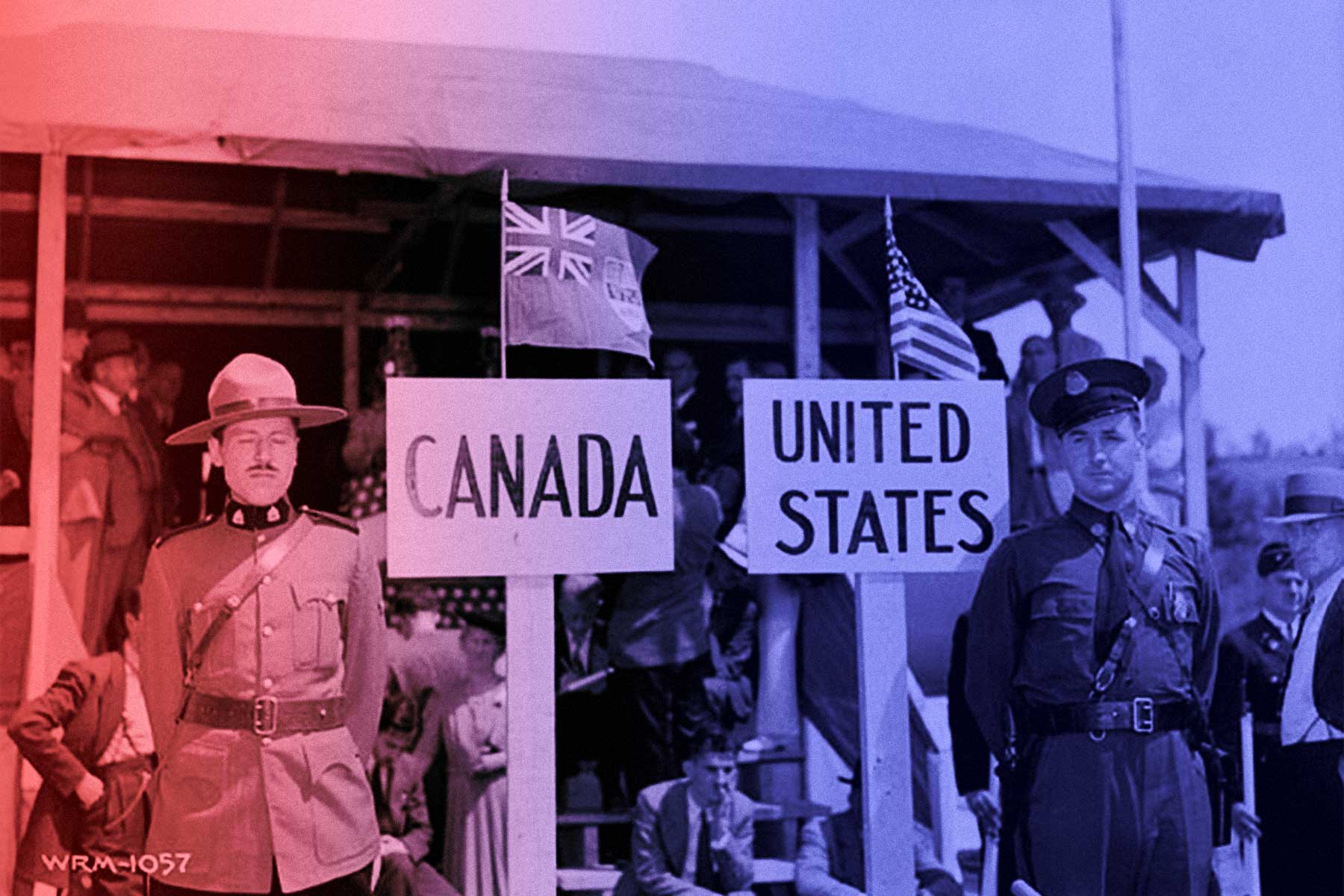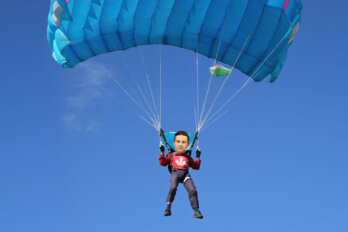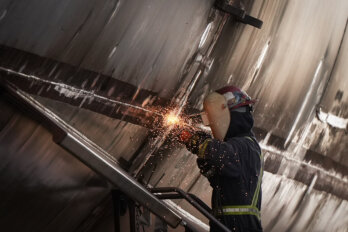Several years ago, I developed an intense and unrequited interest in the letter Z.
It is the one letter whose name changes at the forty-ninth parallel. Even now, I can only read it as “Zed” with effort. You’ve read it too, and its sound in your mind tells you something important about who and where you are.
Z is a small hook on which I have hung an excessive weight of fear and hope. Z means that I am here. On most days, being in Canada does not mean much beyond the ordinary, but there are days when I cannot read or hear or say the letter Z without a sense of stupid, unearned relief. One was the day I watched, on my laptop in Toronto, rioters sack the Capitol. It was the first full pandemic winter: I remember the makeshift home office in our basement, the hum of the space heater, the snow melting on the doormat, the Capitol office where I worked in my twenties suddenly on the screen, with friends and old co-workers inside (mercifully unhurt, it turned out). That night, the same as every night, I sang my daughters the ABC song before bed: “. . . W, X, Y, and Zed.”
My family is American and has been for generations. I come from nineteenth-century Jewish immigrants on both sides. America’s democratic decline, or erosion, or backsliding—grave and heavy metaphors all—should not be my concern in anything other than the bloodless, calculative sense of the way it impinges on my new home. But countries don’t let us off that easily. Hence the claustrophobic sense that, even here, I am still there, in a violent place with more violence to come. Hence my interest in the letter Z.
I would like to believe that I have landed elsewhere, a place with a more usable past and a more open future. I don’t know when or if I’ll begin to think of myself as Canadian. I can’t predict how my three young daughters will come to think of themselves. But I know that a man with children, as the saying goes, has given hostages to fortune. I know that they are hostages to the fortune of this place. And so my feelings for this place, with all of the compounded love and worry and frustration, are bound up with the love and worry and frustration of a parent—in a way that the feelings grow more entangled the deeper my children’s roots here grow, in a way that I couldn’t begin to disentangle them if I tried.
In the United States, I played a bit role in American politics, as a speechwriter in the House and Senate, and then I went back to school to earn my PhD. Now I teach political theory in Toronto. When I try to explain what brought me here, I first look for one of the big capitalized nouns that dotted the immigration stories I learned growing up: Freedom, Religion, Opportunity. But in the space where the great abstract noun is supposed to be, I find only a human-sized tangle of motives.
There is the prosaic: a job. There is the prudential: excellent public schools, fewer guns, paid parental leave, a future in which my children are at least marginally less likely to be crushed under student debt or health care bills. And there are the motives I struggle to find words for even now—the clench in my stomach when I read the news from home, the foolish relief centred arbitrarily on the letter Z.
Who are Canadians to me? “They” or “we”? Neither feels right. To tell Canadians what I believe they are and what I think they should do feels aloof and arrogant. More importantly, it feels false to our community of neighbours and friends here, people I certainly imagine sharing the first-person plural with me. And yet we still feels arrogant in its own right. Who am I, trailing my Americanness behind me, to tell Canadians who we are?
Fully aware that there is no satisfactory solution, I am making an arbitrary choice: we. Call it the aspirational we. The aspiration is simply this: that at some indefinite point in the future, it will come to be accurate.
If there is one theme in the literature of Canadian nationalism, it is the all-pervasive fear of being reduced to a cartographical fiction—or perhaps the fear that Canadians already are and simply, mortifyingly, haven’t noticed yet.
Historically, the Canadian fear of absorption has been compounded by the self-deprecating sense that our differences from America are trivial, that nothing much is in danger of being absorbed after all. As Northrop Frye put it: “What is resented in Canada about annexation to the United States is not annexation itself, but the feeling that Canada would disappear into a larger entity without having anything of any real distinctiveness to contribute to that entity.”
But that claim, if it ever was true, is simply not true anymore. Canadians of an older generation could look south and see a more or less equally democratic neighbour—louder and richer but not enormously distinct from English Canada. Canadians of this generation look south and see something that demands our fear. And this just at the moment we have lost the words for our differences.
Set aside the many millions of Americans who celebrate what their country is becoming; among the rest, over the past decade, I’ve observed a diversity of personalized breaking points that I can only describe as kaleidoscopic. A photo of an immigrant boy behind chain link, draped in a foil blanket. Police in riot gear smashing the head of an elderly protester onto concrete in upstate New York. The president, in a cloud of teargas, brandishing the Bible like a weapon. Uvalde, or El Paso, or Parkland, or Tree of Life, or Pulse nightclub, or Charleston, or Sandy Hook.
I don’t know how January 6 will be remembered, how my children will learn it in school one day: as a failure, a blip, the high-water mark of an authoritarian movement that Americans decisively rejected, beginning with the elections two years later, or as a trial run, a proof of concept, a beginning rather than an ending. But I also don’t know if I’ll ever see another American presidential election that both parties accept as legitimate. I do know that a majority of Republican representatives voted to overturn the 2020 presidential election. I know that, even in the midst of a disappointing midterm for their party, some 200 election-denying Republicans were elected to federal office. I know that nineteen states responded to the election of a Democratic president by rolling back voting rights. I know that politicians have long been in the practice of selecting their own voters for House elections, that the Supreme Court shows no inclination to stop them, and that the algorithms helping them draw their districts have never been more sophisticated. I know that the Senate is the institutional expression of white, rural, minority rule, and that this is fine, because America is a republic, not a democracy. I know what autogolpe means now. I suspect that American English is done being a net importer of authoritarian terms.
In June 2020, a reporter asked Justin Trudeau about Donald Trump’s threat to crush protesters with military force. Nothing sums up the Canadian response to all of these developments better than Trudeau’s famous twenty-one seconds of silence. Say what you will about him, but in that moment, he spoke authentically for his people: our terror at the mere thought of antagonizing the big neighbour, our self-congratulatory sense that truly bad things happen elsewhere, leavened by a pro forma allowance that, of course, we aren’t perfect (“It’s time for us as Canadians to recognize that we too have our challenges”).
Twenty months later, our capital was occupied, our crossings to America cut off, our Emergencies Act invoked for the first time. We too have our challenges.
It was commonly treated as a laugh line that one of the leaders of the Ottawa truck blockade, appearing in court, invoked his First Amendment rights. (“First Amendment?” asked the judge. “What’s that?”) But what a perfect illustration of the fact that the far-right movements in Canada and America are continuous with one another, that the forces that produced Trumpism in America are on the move here too: the same political vocabulary, the same collective imagination, the same conspiracy theories, the same funding sources. The same difficulty, among the political class in both countries, in imagining a constructive response to those forces beyond the sledgehammer of law enforcement.
What I heard in those twenty-one seconds of silence was the most eloquent expression possible of the great Canadian exemption: the idea that the forces upending democracies around the world somehow don’t reach this far north. What I saw in the Ottawa blockade—our own, slow-motion January 6—was its convincing refutation. Our exemption has rarely seemed less secure.
If that is true, then asserting our difference—asserting it in a way that shapes our culture, our diplomacy, our domestic politics, our sense of ourselves—matters in this generation in a way that it has rarely mattered before. Because there is a difference, beginning with this basic fact that has yet to penetrate our politics: our neighbour is an eroding democracy.
Canadian politics needs to start from that reality, because it is the political fact with the farthest-reaching consequences for Canadian life. Canada is not exempt from the polarization, the authoritarianism, and the conspiracizing that have put the future of American democracy into doubt. But Canada is different. If those forces are not so advanced here, it is not because Canada is congenitally behind the times. It is because our democracy can draw on a set of resources that are distinctly of this place. With that in mind, Canadian distinctiveness is not a vanity object: it is the essential safeguard of Canadian democracy.
Reading reports of the first shots of the American Civil War, the Ontario Reform leader George Brown said simply: “We are glad we are not them.” Our future depends on our ability to say something similar, and to mean it; to say it explicitly, not silently; to say it openly enough that it becomes an organizing principle of our national life, not simply a comforting excuse for our failures. Our future depends on our mental independence from America. We can’t effectively protect what sets us apart—from our own institutions like parliamentary government to a remarkable openness to immigration—without understanding what makes them our own. We can’t aspire to anything meaningfully better until we are secure in our difference, until we stop seeing ourselves through American eyes.
In saying that, I do not mean to imply that Canada is some sort of privileged child of history or that all this is a matter of our purity and their contamination. If anything, for much of our history, things have been the other way around. What I have to offer is not some sort of transcendent truth about national characters but rather a set of strategies adapted to the demands of this historical moment, taken in a broad sense—that is, the sense that does not expect the problem to be buried with Trump, the sense that does not expect the Canadian exemption to last in the absence of determined and creative action to lock it in place.
An eroding democracy is a threat to democracy in its neighbours. Think of the ways in which far-right and nativist forces collaborate across borders. Think of Tucker Carlson filming from Viktor Orbán’s Hungary, or Steve Bannon’s post-Trump career as a European fascist, or the cheers for Nigel Farage at a convention for American conservatives, or the pipeline of funding that connects Vladimir Putin and Marine Le Pen, or the 2023 re-enactment of the Capitol riot, planned from Orlando and staged in Brasília. Globally, as measured by Freedom House, those forces have contributed to sixteen consecutive years of democratic erosion. Such forces bear on Canada in many ways, from alleged Chinese interference in federal elections to real estate prices bid up by foreign oligarchs in Vancouver or Toronto. But, by virtue of proximity and power, the most important conduits of democratic instability run due south.
Those conduits are symbolized by the roughly 44 percent of funding for the Ottawa blockade that originated in the United States, by its round-the-clock promotion on Fox News and other right-wing media, and by its celebration in the American far-right and anti-vax movements. In the words of a 2022 report issued by Canadian intelligence experts, including high-level advisers to both the Harper and Trudeau governments, “the United States is and will remain our closest ally, but it could also become a source of threat and instability.” A little less cautiously, we might say that it already has. As one of the report’s authors put it, “there are serious risks of democratic backsliding in the U.S., and at this point, that is not a theoretical risk. So all of that is a threat to our sovereignty, to our security, and in some cases, to our democratic institutions.”
On their own, those facts are worrisome enough; in context, they are more so. The history of this hemisphere is a history of a hegemon willing and able to build up and pull down neighbouring governments—a history from which Canada has by no means been exempt. It is hard to imagine a democratically eroded America being more friendly to Canadian democracy, a democracy that would begin to look like a standing rebuke.
More abstractly, America’s power and prestige have always lent it a sort of political gravity. Powerful states, whatever their form of government, prompt envy and emulation. It seems as if they make the history the rest of us merely watch, as if they come from slightly in the future. They set the bounds of common sense within which the rest of us operate. Maybe an authoritarian America would provoke only revulsion here—I’m sure it would in many of us. But authoritarianism wouldn’t have a constituency if it didn’t have its own glamour and appeal. Slowly and steadily, without any of us explicitly acknowledging its influence and many of us loudly disclaiming it, it would shape our sense of what is possible here—of what is permissible here.
Resisting that process begins by looking the facts in the eye: the historical situation in which Canadians find themselves is fundamentally changed. Once, our connections to America were the many channels through which democratic ideas and practices entered our country; today, the situation is closer to the opposite. A free society cannot insulate itself from such influences, nor should it want to. But it can sharpen its critical capacity to assess and filter those influences as they arrive.
Our difference is not a luxury good, something for a rich and mostly contented people to worry about in the absence of more pressing concerns. On the contrary, it is our democratic immune system. And if that is the case, then the central challenge of Canadian politics at this moment is to develop and elaborate the idea of our difference; to discover, if we can, its deep roots in our history; and to give that idea an institutional and political expression.
Saturated as we are by American media, and used to our position as a junior power on this continent, it is all too easy to see our difference through an American lens. What we see, and internalize, is a set of trivialities: milk in bags, beavers, some peculiar spellings. Even some potentially further-reaching facts, like universal health care, stand out in isolation, almost as accidents, maybe as objects that we are fearful of somehow misplacing. The prototypical American gesture toward Canada is a pat on the head. “A really nice apartment over a meth lab,” in Robin Williams’s famous line. America’s Hat.
I don’t want to read too deeply into that gesture, because it’s the privilege of any empire not to take too deep an interest in its smaller, weaker neighbours. For our part, we do not need others to take us seriously. We do need to take ourselves seriously. In that regard, the problem is that the triviality we see reflected back at us is the product of someone else’s needs, not our own. Much of our trouble in imagining ourselves as meaningfully separate serves political ends we never consented to and answers questions we ourselves never asked.
Canadians need to think more deliberately about building (in the words of David Graeber and David Wengrow) structures of refusal: deliberate, systematic choices about what to accept from our neighbour and what to reject, the choices through which we define and maintain our difference. We are what we refuse. In an age of democratic decline, Canada’s democracy depends on refusal—serious, targeted, and creative.
In my book Not Here: Why American Democracy Is Eroding and How Canada Can Protect Itself, I lay out four key refusals, all of which can help make an authoritarian future less likely in Canada. The refusal of the dangerous idea of one “real” Canadian people. The refusal of political charisma and founder worship. The refusal to separate democracy from economic solidarity. And the refusal to let great-power conflict abroad justify democratic erosion at home.
At times, it seems as if the visible signs of our difference are so small and so slight that I’m a fool to hang so much on them. And then the light shifts, and they become the evidence of things unseen: the long “o” in process and tomorrow and sorry; “washrooms”; “lineups”; waiting for the light to change at the crosswalk, without a car in sight; the late onset of summer, so joyful that it hurts. Things will be different here. When the news from home is particularly bad, I’m embarrassed that things so trivial should be so consoling, ashamed by the intensity with which I want to believe that things will be different here, by the fear that they will not be.
I’ve been singing my daughters the ABC song at bedtime their whole lives. I changed it when we moved here: “. . . W, X, Y, and Zed.” Things will be different here. My youngest daughter is just a few months older than this book. My middle daughter has been here since she was two months old; she came in her sleep, facing backward in a bucket car seat in a van trailing a U-Haul, and that version is the only one she knows. But my oldest daughter still remembers when I sang it to her in our tiny apartment in the States, and she knows something about the difficulty of leaving; and whenever I try to change the last letter, she reacts with outrage that anyone would violate the sanctity of the alphabet. Before I can end, she claps her hand over my mouth: “Zee, man. It’s Zee.”
Excerpted from Not Here: Why American Democracy Is Eroding and How Canada Can Protect Itself by Rob Goodman. Published by Simon & Schuster. Reproduced by arrangement with the publisher. All rights reserved.





